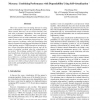12 search results - page 2 / 3 » Fault tolerant MapReduce-MPI for HPC clusters |
ICDCS
2012
IEEE
11 years 7 months ago
2012
IEEE
Today’s largest High Performance Computing (HPC) systems exceed one Petaflops (1015 floating point operations per second) and exascale systems are projected within seven years...
ICPP
2007
IEEE
13 years 11 months ago
2007
IEEE
There has recently been increasing interests in using system virtualization to improve the dependability of HPC cluster systems. However, it is not cost-free and may come with som...
CCGRID
2006
IEEE
13 years 11 months ago
2006
IEEE
With the increasing number of processors in modern HPC(High Performance Computing) systems, there are two emergent problems to solve. One is scalability, the other is fault tolera...
FGCS
2002
13 years 4 months ago
2002
Initial versions of MPI were designed to work efficiently on multi-processors which had very little job control and thus static process models. Subsequently forcing them to suppor...
HPDC
2000
IEEE
13 years 9 months ago
2000
IEEE
Current processor allocation techniques for highly parallel systems are based on centralized front-end based algorithms. As a result, the applied strategies are restricted to stat...



